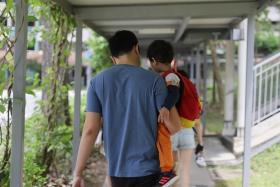MPs say it is crucial Singapore does not allow meritocracy to slide
MPs address inequality issue, give suggestions on bridging class-based divide in Singapore
One week ago, President Halimah Yacob said in her inaugural opening address in Parliament that Singapore had to tackle the issue of inequality and not allow it to become entrenched in society.
Speaking in Parliament yesterday, Minister for the Environment and Water Resources Masagos Zulkifli and Mr Ang Wei Neng (Jurong GRC), among others, gave their take on how to tackle class-based divides in society and ensure the system of meritocracy prevails.
GIVING BACK TO SOCIETY
Mr Masagos, an MP in Tampines GRC, said at the heart of the Singapore model of meritocracy is the spirit of giving back among those who achieved success, to those who are in need.
"Share our time, talents and treasures with those in need," he said.
"As employers, uplift wages of our employees. As colleagues, support those with caregiving responsibilities. Everybody can join the SG Cares movement to play a part and give back. Be kind to our fellow Singaporeans in their daily lives."
SG Cares is the national initiative to support volunteerism and to create a caring and inclusive society.
Mr Henry Kwek (Nee Soon GRC) said he hoped SG Cares could be a centrepiece for Singapore and that volunteerism can become a defining aspect of what it means to be Singaporean.
KEEP THE COMMON SPACES
Mr Masagos said that Singapore must preserve its shared spaces such as neighbourhoods, hawker centres, parks and schools.
On his travels overseas, he saw neighbourhoods and schools meant for the wealthy and connected, while visitors are advised to avoid certain areas - typically where the low-income or new immigrants gather.
"That is a failure of meritocracy that we have avoided and must never allow to take shape in our future," he said.
This is why in Singapore, the Government must distribute rental housing across the island and mix public and private housing more deliberately to ensure that the needy are not deprived of access to good quality public facilities, he said.
FRIENDSHIPS ACROSS SOCIAL DIVIDES
To help youngsters of different backgrounds mix and form friendships, Mr Kwek urged the Ministry of Education to encourage collaboration between elite schools and other schools so that students of different backgrounds can link up with one another.
Students from different schools can get together through common programmes like youth sports and values-in-action initiatives.
Mr Kwek said: "When Singaporeans willingly come together to socialise, they will treasure the bonds they build."
GREATER CLASS DIVERSITY IN SCHOOLS
There should be greater diversity of students in elite schools, said Mr Ang.
He suggested that the principal of each "non-elite" primary school nominate one student to enter a top secondary school. This student can be from a disadvantaged background and might have missed the cut-off score by a few points but has the "intellect, temperament and potential" to make it in a top school.
He also suggested that Special Assistance Plan schools be open to students who have not taken Higher Chinese or those who are non-Chinese.
ENHANCE GOVERNMENT POLICIES
Said Mr Masagos: "Government policies have to act as enablers, as ladders and bridges, to provide a fair chance for everyone to move up in society.
"The Government must therefore not allow meritocracy to reward narrowly, and instead broaden and make alternative routes available."
He added that policies must enable self-reliance through encouraging work, while also helping the workforce to be ready for the future.
Mr Kwek suggested that ministries do more to help the needy be financially literate.
He added that there can be a review of the Registration of Criminals Act to encourage rehabilitation and hoped the rental housing environment be improved to support the needy.
FOR MORE, SEE PAGE 10 & READ THE STRAITS TIMES TODAY
Get The New Paper on your phone with the free TNP app. Download from the Apple App Store or Google Play Store now


